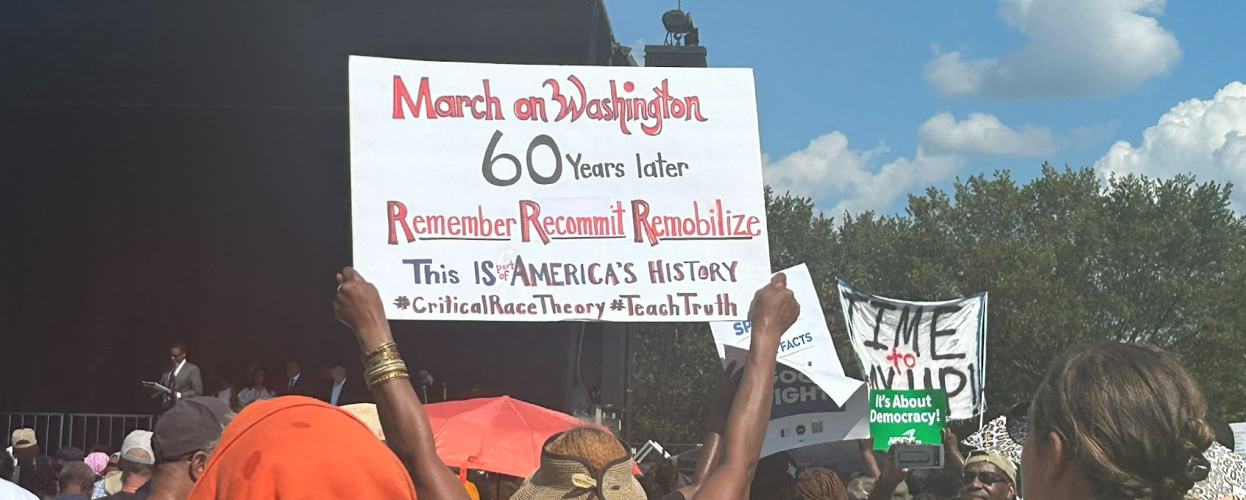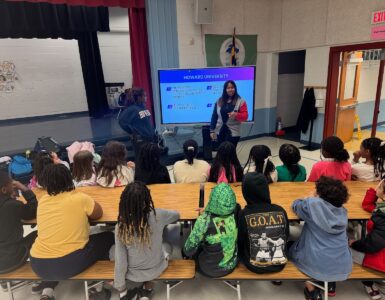On Saturday, Aug. 26, tens of thousands of people gathered under the blazing sun at the Lincoln Memorial to commemorate the 60th anniversary of the March on Washington. Before the march began, participants connected with each other through music and paintings, shared experiences, and a common goal. While the moment was a celebration of history, speakers reminded attendees that they were marching in real time for a just and equal nation parallel to the one Dr. Martin Luther King Jr. spoke of on Aug. 28, 1963.
Marginalized groups across the United States are still struggling against racism, poverty, and systems that threaten their human rights 55 years after the conclusion of the Civil Rights Movement. Racial disparities in homeownership, voter suppression, and police brutality continue to plague the country, proving that Dr. King’s work is far from complete.
The United States faces increased gun violence and a worsening climate, which Yolanda Renee King – Dr. King’s granddaughter – said “are issues that earlier generations didn’t expect, but [her] generation cannot escape.” Her passionate voice rang out in an unwavering fashion similar to her grandfather’s as she said, “No matter who you are, you are not safe from random gun violence and irreversible climate change.”
This statement comes during increasingly perilous times that are putting more Americans at risk with each passing day. In 2021, gun violence in the U.S. reached an all-time high of 48,830 deaths–a number the nation is coming dangerously close to surpassing, as 44,371 gun-related deaths have occurred in 2023 as of Aug. 29.
According to NASA, July 2023 was the hottest month in history. Human-caused greenhouse emissions and rising sea levels are major contributors to these record-breaking temperatures. “Humans are to blame,” said UN Secretary-General António Guterres in a call to action last month. “The era of global warming has ended [and] the era of global boiling has arrived.”
The march’s attendees understand that combatting the issues the U.S. faces will be nearly impossible without a sense of unity across communities. “I wish we could all be more united to carry out [Dr. King’s] legacy, so we can have equality for marginalized communities,” said veteran and former New York police officer Baijmadajie Angwang.
In Sept. 2020, the FBI wrongfully accused Angwang of being a Chinese spy. The government dropped the case in January of this year. “I’ve served the country [and] served the community, but because of my birth origin and my race, I was challenged by our government,” he said. “Throughout my own tragic experience, I realized there’s so much more we have to improve and work on.”
Anthony Carter, 62, constantly prays to see “more love, peace, and togetherness,” and claims Americans must “stay together, be together, and work together,” to fulfill the Civil Rights Movement’s mission. His father, Lamonte Carter, attended the March on Washington in 1963 and recognized there isn’t one specific thing people must do to win this ongoing battle. “There’s so many things to do,” he began, “but whatever you do, do something positive.”
To carry on Dr. King’s legacy effectively, artist Jeromyah Jones believes people must march and fight in peace and with clear intentions. He suggests that future generations “put humility over pride [and] the arrogance of man” and hopes posterity “will be able to sit down with one another.” He showcases this desire in a painting titled “The D.O.P.E (Dissertation on Peace Exhibit)” – a project he and his father worked on for nearly a year. The painting is roughly 4.5 feet by 17 feet and features solutions to the world’s dilemmas through biblical symbolism.
Jones and his father took inspiration from their lives to create the painting, including imagery of two women they met in Ethiopia which symbolizes the bridge between Africa and African Americans, a bridge they believe is “much needed.” In the center of the painting is a representation of what Jones calls “the Prince of Peace” in front of 8 beams symbolizing new beginnings, surrounded by the nine victims of the 2015 Charleston church shooting. Each victim is paired with a fruit of the spirit. “These nine fruits need to be instilled in every human for us to reach the pinnacle of peace. [They are] love, joy, peace, long-suffering, goodness, gentleness, meekness, faith, and temperance,” Jones explained.
Jones hopes his audience will understand that the message behind his work is just as important as the imagery. “We want them to know that we must follow in the footprints of peace if we are to reach that day we all seek.” His art embodies Dr. King’s wish for the Black community to “rise to the majestic heights of meeting physical force with soul force.”
After seven hours of orations on behalf of various groups such as the National Fair Housing Alliance, the Divine Nine, and various churches, Rev. Al Sharpton and the King family concluded the main event around 3 p.m. Various chants demanding justice and equality reverberated throughout the National Mall as the crowd marched to the Martin Luther King Jr. Memorial.
The March on Washington’s 60th Anniversary built community, gave marginalized voices a platform to be heard, and successfully kept the spirit of the Civil Rights Movement alive. The King family and those who spoke before them continually expressed that to efficiently execute Dr. King’s goals, there is still a substantial amount of work to be done.
Through this, Yolanda Renee King believes her generation “will be defined by action, not apathy.” Before leading the marching crowd, she stood firmly at the podium in front of the Lincoln Memorial and led the audience in a chant uplifting her generations and those to come. “Spread the word. Have you heard? All across the nation, we are going to be a great generation.”










Recent Comments